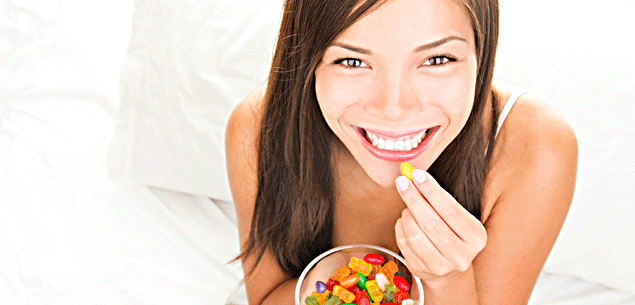If you’ve been trying to reduce the amount of sugar you eat but are finding it’s a losing battle, there could be a good reason why – you may be addicted.
There have long been theories about why some of us can’t seem to help consuming so much of the sweet white stuff, but now a new study backs up the idea that, for some people, sugar can be addictive in the same way drugs such as heroin or cocaine are.
A study conducted by scientists at Harvard University found that high-sugar foods trigger activity in the part of the brain also known to be affected by other sorts of addiction.
Their work echoes other research that suggests a biochemical response – and not a lack of willpower – can be the reason why some of us find it so hard to resist stuffing ourselves with chocolates, lollies and other sweet foods.
Although there’s increasing evidence about why our bodies crave sugar, there is still a lot of debate about just how potent this addiction is, and how to overcome it. Some nutrition experts say the best way to deal with it is, like any other addiction, to go cold turkey and completely eliminate the substance from your life.
Like a smoker giving up tobacco or a heavy drinker ditching alcohol, removing sugar from your diet can leave you with withdrawal symptoms, especially in the first few days. Many people report feeling anxious, shaky and tired, and have headaches.
However, other experts recommend that instead of trying to get rid of it altogether – which can be very hard because many foods contain hidden sugars – we should cut back as much as possible and make smarter food choices.
Here are some tips:
● Get your sweet hit from sources other than refined sugars. Start with dried fruits such as apricots, which are still quite high in sugar, and then move to fresh fruit, such as berries.
● Cut down on processed foods. There’s sugar in items such as sauces, salad dressings, baked beans and flavoured coffees. Read labels and choose foods with the least sugar.
● Recognise the other names for sugar on labels. These include dextrose, fructose, glucose, lactose, malt syrup, molasses and sucrose. Then avoid them.
● Eat plenty of protein. It is digested more slowly by the body so you feel fuller for longer and are less likely to snack. Plus, it won’t send your blood sugar soaring.
● High-fibre foods also make you feel fuller (but be wary of eating lots of carbohydrates, as starchy foods still contain sugars). Bran cereals and veges are good sources of fibre.
● Plan sensible snacks. Depriving yourself of a snack can lead to bingeing on sweet foods later. Have a selection of snacks that are low in sugar on hand, such as nuts and seeds, a hard-boiled egg, low-fat yoghurt or carrot sticks and hummus.
● Don’t think you’re okay with “healthy” sweet foods like honey. They still have the same effect on your blood sugar.
Here are six clues you may be addicted to sugar:
1* *Even if you’re not hungry, you eat sweet foods because you crave them.
2* *You know you should cut down on sweet stuff but can’t imagine getting through the day without it.
3* *If you don’t have your daily fix, you start to feel bad and it’s all you can think about until you give in and have something sweet.
4* *You feel tired and sluggish after you overindulge.
5* *You need more and more of these foods to get pleasure from them – a couple of biscuits is not enough.
6 You have health problems due to your diet (for example, you’re obese) and keep eating high-sugar foods even though you know you are making things worse.




